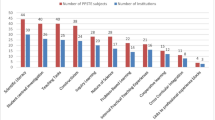
Overview
- Increases understanding of the effect of disadvantage in learning science
- Provides insight in a key blockage in the educational pipeline
- Focuses particularly on science learning at the interface between secondary and tertiary level
- Draws on over 15 years of experience in access programmes
- Reviews research results in key areas of this enterprise
Access this book
Tax calculation will be finalised at checkout
Other ways to access
About this book
Higher education internationally is in a state of transition and transformation, leading to an increase in the level of participation, and a consequent increase in number of non traditional and underprepared students. The appearance of these students provides a particular challenge in the sciences where adequate grounding is crucial. One response to this challenge has been the provision of access, foundation or "second chance programmes" which operate on different models internationally. In South Africa, where the push for equity is strong in the wake of the apartheid era, programmes have generally been established at all tertiary institutions with some of the most successful of these programmes based at universities characterised by a high research output. Consequently in the last decade there has been a great deal of research into the effectiveness of these programmes both at a micro and macro level. Similar research in other countries exists, but is patchy and often based on small groups of students. This book provides valuable information on what research has to say about disadvantaged and under prepared science students and how they learn - what works and what does not work. It provides an examination of issues related to the programmes, their structure, student selection and adjustment. Issues such the learning of these students, their communicative ability and laboratory work come under the spotlight. Although examining the issue internationally, the book draws heavily on lessons from South Africa where there has been considerably experience of such programmes.
Similar content being viewed by others
Keywords
Table of contents (9 chapters)
-
Front Matter
-
Lessons from Africa
-
Front Matter
-
-
Back Matter
Authors and Affiliations
Bibliographic Information
Book Title: Identifying Potential for Equitable Access to Tertiary Level Science
Book Subtitle: Digging for Gold
Authors: Marissa Rollnick
DOI: https://doi.org/10.1007/978-90-481-3224-9
Publisher: Springer Dordrecht
eBook Packages: Humanities, Social Sciences and Law, Education (R0)
Copyright Information: Springer Science+Business Media B.V. 2010
Hardcover ISBN: 978-90-481-3223-2Published: 28 July 2010
Softcover ISBN: 978-94-017-8494-8Published: 14 November 2014
eBook ISBN: 978-90-481-3224-9Published: 20 July 2010
Edition Number: 1
Number of Pages: VII, 183
Topics: Administration, Organization and Leadership, Science, Humanities and Social Sciences, multidisciplinary, International and Comparative Education, Science Education, Higher Education, Mathematics Education



